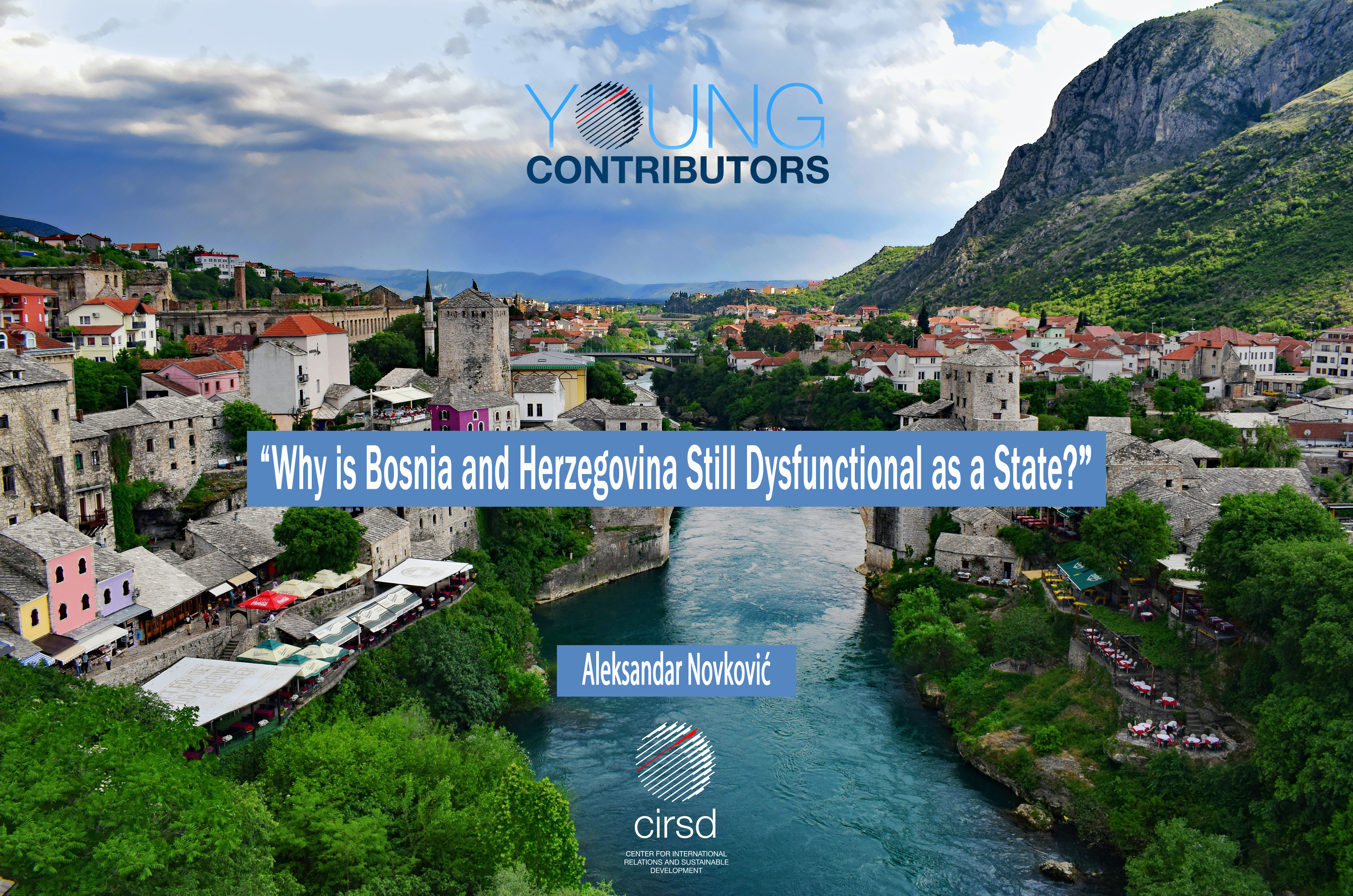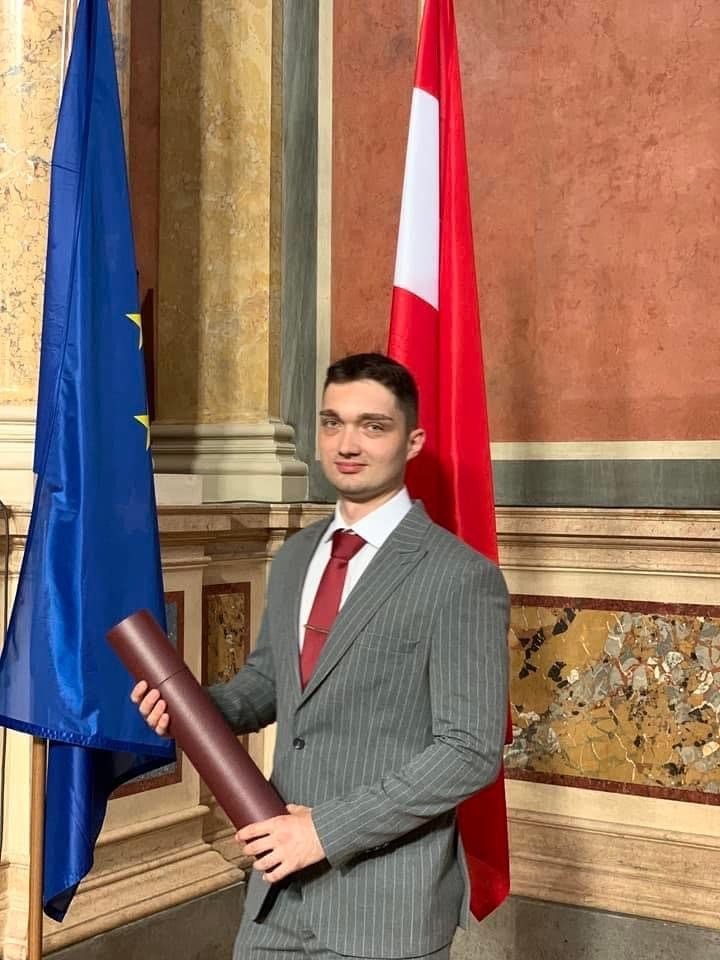With government in one of its entities operating in a technical mandate since 2015, followed by a none-coherence of a single foreign policy and internal tensions accompanied by constant ethno-nationalist rhetoric, there is a consensus among scholars that Bosnia and Herzegovina (henceforth Bosnia) is a dysfunctional state. In this regard, two questions arise: Why is it dysfunctional? Was it solely the fault of the constitution or have political elites misused fear as a political principle for their benefit that consequently crippled the country?

Bosnia’s Political System
Following the dissolution of communist Yugoslavia, the Dayton Peace Agreement signed in Paris in December 1995 had ended a brutal civil war and paved the way for a new constitution in line with consociational political theory of power-sharing which was pioneered by a Dutch American political scientist Arend Lijphart. This consociational model is reflected on Bosnia’s state, entity and cantonal levels by adhering to principles of grand coalition, cultural autonomy, proportionality and minority veto. The executive on the state level consists of a tripartite Presidency for each of ‘constituent peoples’ (two elected from entity the Federation of Bosnia, henceforth Federation) and one member from entity the Republic of Srpska (RS henceforth). Furthermore, the executive consisting of a quasi-government of Bosnia called the Council of Ministers is led not by a prime minister but by a chairman. Lastly, the legislative body on the state level is divided into the lower legislative chamber – the House of Representatives (consisting from 42 members – 28 from the Federation and 14 from the RS) and the upper legislative chamber – the House of Peoples (with 15 members – 10 from the Federation and 5 from the RS). Both entities have a government, a single president (with two vice-presidents), an upper and lower legislative chamber with veto powers, a separate judiciary and a police force. In addition, the Federation is divided into 10 cantons, each with its own executive, legislative and judicial branches. Finally, a special Brčko District serves as a condominium of the Federation and the RS, which belongs to neither entity and has a hybrid status with its own government, assembly and court. On top of this complex political structure, Bosnia has its own viceroy in the form of the Office of High Representative (OHR henceforth), overseeing the implementation of Dayton Peace Agreement and using its vast veto powers in order to overcome political deadlock in the country.
By looking into the political structure of Bosnia as described above, one could argue that it is solely the political system to blame for its dysfunctional nature. However, the truth lies somewhere in between as both the political system coined in Dayton and the everlasting ethno-nationalism of political elites are to be held responsible for creating a dysfunctional state to this day.
Political marginalization in the Federation entity
Bearing in mind the fact that Bosnia has asymmetric political system in its entities i.e. the RS functioning as an unitary entity whereas the Federation with its 10 cantons operates as a ‘loose federation’, the dysfunctional argument is leaned more within the Federation since it is there where most of internal blockades occur. Naturally, blockades occur in the RS entity as well, for instance, in terms of refusing to abide with the verdict of Bosnia’s Constitutional Court, however, this is related to the requirement of reforming the same court since three out of nine judges are reserved for foreigners who are selected in the European Court of Human Rights. The debate and fear lie in a possibility that foreign judges may outvote Croat and Serb judges by aligning with Bosniak ones. Back to the Federation- the blockades within Federation entity include for instance the refusal of Federation’s President to name judges to the Federation’s constitutional court (only recently resolved under pressure from OHR). Further, the government of the Federation operates for years in a technical mandate due to a lack of agreement between leading Bosniak and Croat political parties on implementing the Ljubić-case verdict from Bosnia’s Constitutional Court in 2016 for the election process of delegates to the upper legislative chamber of the Federation. On top of this, Croats which consist 22.4% population of the Federation exercised their outrage by being marginalized in sense that the seat of the member of the State Presidency reserved for a Croat, was predominantly elected by Bosniak votes on three occasions, thus deeming the election process in the Federation as unconstitutional and illegitimate. In addition, the aftermath of October elections in 2022 showed that a Croat member of the State Presidency became Željko Komšić which is his fourth term in this office, again mostly due to Bosniak votes since the Federation entity is one electoral unit and all citizens may vote for either a Bosniak or a Croat candidate, but not for both.
In other words, the notion of marginalization in the Federation is demonstrated in sense that Bosniaks have managed to influence to a great extent the election outcome of Željko Komšić for a Croat member of the State Presidency four times by now (in 2006, 2010, 2018 and 2022). Additionally, the delegation process for 17 Croat delegates in the Federation’s upper legislative chamber from 10 cantonal assemblies is again influenced by Bosniak dominated cantons since all cantons have to provide at least one delegate to the upper legislative chamber, which is responsible for exercising veto powers and nominating the President of the Federation. Surprisingly, on the night of the election day, the High Representative of Bosnia Christian Schmidt imposed measures to improve functionality of the Federation in terms of inter alia streamlining government decision making, appointment of judges, improving the proportionality of constituent peoples in the upper chamber of the Federation i.e. the Federation’s House of Peoples and amending the number of seats from 17 to 23 reserved for Bosniaks, Croats and Serbs respectively and increasing the number seats for ‘Others’ from 7 to 11. Consequently, the latest imposed decision by the High Representative has received a backlash from Bosniak political elites, however this imposed decision should contribute to a more functional Federation by satisfying some of the political desires of Croats for legitimate representation in line with previously mentioned Ljubić-case verdict in 2016. Nevertheless, the issue with the election process for a Croat member for the State Presidency remains to be resolved.
Using fear as a political principle
Fear is often used as a tool in the political arena to mobilize a specific (ethnic) constituency usually before elections in order to secure enough electoral votes in a democracy. By ‘constructing’ the narrative of fear, political elites tend to reshape the electorate. This method is often described by constructivists and their main political theorist Alexander Wendt. The case of Bosnia as a Transitional or Hybrid Regime on a democracy scale is no exception, with exacerbated initiatives deriving from three main ethnic groups to amend the Dayton-coined constitution. On the Bosniak political elite side, there are abundant calls for the creation of the unitary state on the central level and without existing two entities accompanied with their veto powers. Furthermore, a desire for crafting a single “Bosnian” identity was set out in the leading Bosniak party’s Declaration in 2019. Naturally, Croat and Serb political elites opposed this idea because of the ever-growing fear of majorization since Bosniaks comprise half of Bosnia’s population according to the 2013 national census. Consequently, Croat political elites have revived the need for resurrecting the war time parastate of Herzeg-Bosnia, as a required institutional protection for Croats in Bosnia, or in the Federation entity to be precise. In addition, a leading Serb political elite responds by announcing a referendum for a secession of the RS entity in order to secure that Serbs avoid a similar political marginalization as Croats are experiencing in the Federation in terms of electing a Croat member of the State Presidency and delegation process in the upper legislative chamber. In other words, Croat and Serb political elites fear that delegating more competences to a central state level will inherently benefit mostly Bosniak political elites which strive what most majorities in a country desire - a civic unitary state where one vote is equal to one citizen. Since this model of democracy fits perfectly the policy of Bosniak majority in Bosnia, a backlash from smaller constituent peoples which have a well based fear that their national identity and political rights will (continue) to be jeopardized which is not coming as a surprise. The fear creation started to re-emerge during the election campaign in 2006 after the presence of the international community in the form of the OHR started to diminish. Further, since 2006 and to this present day, the main political parties of Bosniaks, Serbs and Croats are extensively using the ethno-nationalistic rhetoric which consequently causes a deadlock in Bosnia which is followed by a lack of trust and willingness to compromise even over problems that affect whole country.
Conclusion
To conclude and answer the questions of why is Bosnia still a dysfunctional state more than two decades after the peace treaty was signed and if it is the blame for dysfunctionality solely Bosnia’s constitution or Bosnia’s political elites – the answer cannot exclude the first aspect from the second one. In other words, the constitution did not prevent a political marginalization predominantly in the Federation entity which is therefore distancing Croat political parties from an idea of a strong ‘central state’. Furthermore, this political marginalization is showing to Serb political parties what could occur if they were to renounce their right to autonomy or even try to delegate possessed power-sharing competencies for the benefit of a central state. Additionally, the ethno-nationalism and usage of fear as a political principle is being abused by political elites in order to mobilize ethnic constituency against other ethnic groups, thus causing mistrust and advocating solely for the requirements of their own ethnic unit. Lastly, a reform of Bosnia’s constitution is required, however, it should be done in line with Arend Lijphart’s power-sharing model which initially brought peace to Bosnia after a civil war. Great examples of other consociational states in Europe such as Belgium and Switzerland demonstrate that the power-sharing model is sustainable as long as political marginalization is absent, which benefits the state as a whole.

 Author:
Author:





